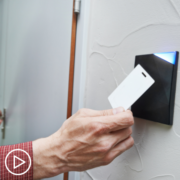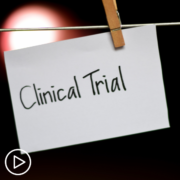What Endometrial Cancer Patients Should Know About Clinical Trials
What Endometrial Cancer Patients Should Know About Clinical Trials from Patient Empowerment Network on Vimeo.
What do endometrial cancer patients need to know about clinical trials? Expert Dr. Ebony Hoskins explains the importance of clinical trial participation for all patients and shares advice for patients to improve their clinical trial access.
Dr. Ebony Hoskins is a board-certified gynecologic oncologist at MedStar Washington Hospital Center and assistant professor of Clinical Obstetrics and Gynecology at Georgetown University Medical Center.
[ACT]IVATION TIP
“…asking their provider, one, are clinicals trial offered at their institution. And second, if it’s not offered at the institution, do you think that, are there any other institutions that may offer trials for the patient?”
Download Guide | Descargar Guía en Español
See More from [ACT]IVATED Endometrial Cancer
Related Resources:

Emerging Endometrial Cancer Treatments | Promising Data and Challenges |

Endometrial Cancer Treatment Options for Patients to Consider |

|
Transcript:
Mikki:
Dr. Hoskins, why is clinical trial participation so important in endometrial cancer? What advice do you have for patients considering a clinical trial?
Dr. Ebony Hoskins:
So I think clinical trial participation is important in endometrial cancer. Number one, the rate of Black women getting advanced and aggressive endometrial cancer is on the rise. The representation in these trials are different. What’s different is not only the patient, the tumor type is different. How do we know that these same patients that’s not in the trials are going to respond to this treatment? That’s what I always ask. I’m like, maybe they don’t respond as well, because that’s a different disease type, right?
So we recently looked at a trial where most of the patients had an endometrioid type of endometrial cancer, whereas I, in my practice, I see a lot of Black women who don’t have endometrioid type. They may have a serous type, which is a more aggressive type or a carcinosarcoma. So I don’t know if I can really apply that to this, to that the medication.
That’s all I have, but how do I know that she’s going to respond in the same way? So I think it’s definitely important. I recently had a patient that I referred to a clinical trial. And she really was struggling with whether she should do it or not. And one of the things that I said to her is, “I think it’s important. One, you’re going to have access to advanced treatment options that are not there now.” And I said, also I said, “Not that she has to take it for a whole group, but we need to have more information on the type of cancer you have.” And I was like, “And Black women are dying, and we need this information to know if this is the same.” And she instantly was like, “I’m going, I’m doing it.” And I mean, not that she has to take, but we need to know more. And I think it’s very important that we have patients with access to trials.
Mikki:
Yes. Do you have an activation tip for those patients that you see?
Dr. Ebony Hoskins:
I think asking their provider, one, are clinical trials offered at their institution. And second, if it’s not offered at the institution, do you think that, are there any other institutions that may offer trials for the patient? There are sometimes where patients don’t have the opportunity to travel elsewhere and need to be in their community for work, family, etcetera. So I understand the asking.
Share Your Feedback:
Create your own user feedback survey














